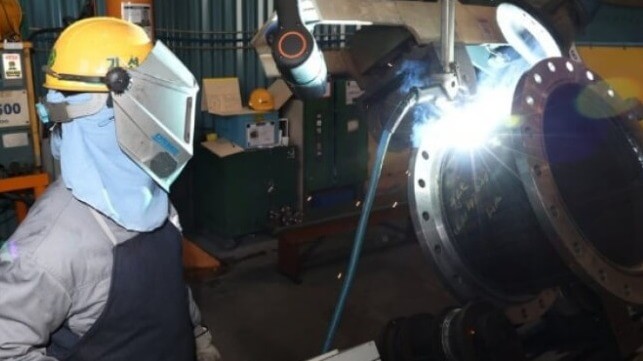DSME Uses Collaborative Robots for Productivity in Shipbuilding

Daewoo Shipbuilding & Marine Engineering (DSME) is using a novel solution to address the continuing shortage of workers and skilled trades for the shipbuilding industry. The shipyard announced that it has begun deploying a type of automated welding system based on cobot (collaborative robot) technology. The South Korean shipbuilding industry has been looking to new forms of technology to improve its productivity and help address its shortage of workers.
A concept that has been developed over the past 20 years, cobots are designed to work alongside humans. They share the same spaces as their human counterparts and can work in collaboration on a task, versus for example the robots used in car manufacturing that work independently.
The application of industrial robots requires the installation of safety fencing which separate humans from the robots. The goal is to prevent humans from colliding with the robot during its operation but with a cobot safety analysis is carried out. They are designed to work with humans without the fear of collision. The shipbuilder received a safety certification for the collaborative robot installed workplace from the Korea Robot User Association.
DSME reports that it has begun using cobots for welding work during shipbuilding operations. The first application is for ship piping control work. Before they deployed the cobots, DSME says that workers were required to position the welding equipment and assemblies themselves, which often weighed up to more than 60 lbs. In addition, they note that it will reduce the time required for preparing the work site by 60 percent.
Using this new technology, DMSE says is expected to improve productivity and also address the worker shortage. It will also reduce worker fatigue by requiring less lifting and repositioning of the equipment and in the work area. They also expect to be able to apply the application to general piping work.
This comes as the latest step by the shipbuilding industry which has been appealing to the South Korean government for help in addressing the labor shortages. Last year, the government promised additional support including sponsoring vocational training and apprentice programs while also encouraging the shipyard to employ new technologies.

that matters most
Get the latest maritime news delivered to your inbox daily.
The government has promised to also expand the guest workers programs by making more visas for skilled tasks. Welders are one of the areas frequently cited. In addition to providing more visas, the government is reportedly moving to double the length of time skilled workers who learn Korean can stay in the country. Currently, it is limited to less than five years with workers required to leave South Korea and reapply for a visa. The new program will reportedly double the length of stay up to 10 years.
Rival shipbuilding Samsung Heavy Industries last week reported that it had brought in a total of 41 Indonesian welders, the largest single batch of foreign workers coming to South Korea since the visa programs were expanded. Samsung reports it currently is employing more than 780 foreign workers. The shipbuilding said its target is to nearly double the number to 1,200 in the year ahead.
